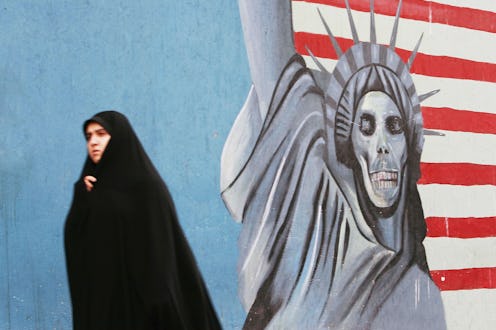News
Sorry, Obama's Going to Meet With Who Next Week?
Iranian President Hasan Rouhani declared his intentions for a "constructive approach" to a relationship with the United States in a Washington Post Op-Ed Thursday night, furthering speculation that he and President Obama might meet up in person next week to work on defrosting the countries' icy relationship.
It just so happens that Rouhani and Obama will both be in New York City for the annual UN General Assembly meeting. Although nothing's officially on the calendar, Obama's up to getting together, according to White House spokesman Jay Carney.
"It's possible, but it has always been possible," Carney told reporters Thursday night. "The extended hand has been there from the moment the president was sworn into office."
The will-they-won't-they diplo-date signals a potential thawing of relations between the two countries: The leaders of the United States and Iran haven't met since 1979, following the Iran Hostage Crisis.
And then there was the whole ... nuclear weapon thing. Western governments think that Iran's hiding something —namely nukes — but Iran swears everything's fine, really.
"We have never pursued or sought a nuclear bomb and we are not going to do so. We solely are looking for peaceful nuclear technology," Rouhani told NBC's Ann Curry on Wednesday in his first interview with a Western journalist.
The possibility of dialogue began after Obama sent Rouhani a letter of congratulations after his election in June, because let's be honest, Obama wasn't a huge fan of Rouhani's predecessor, former President Mahmoud Ahmadinejad. Rouhani was happy Obama made the first move, calling the resulting exchange of letters "tiny steps for an important future."
And it looks like the centrist Rouhani's trying to make things work out between the two countries, or at least that's how it came off in the interview with Curry. Rouhani is certainly using a much nicer tone than Ahmadinejad, to start, who was seen as very anti-Western.
Rouhani came across in his interview as supportive of pro-democracy uprisings in the Middle East, and appeared to support loosening up on Iran's extensive Internet firewalls that have blocked social media since the 2009 Iranian election protests. (That said, a glitch Monday that briefly let down said firewalls was quickly repaired to block usage once again.)
"In today's world, having access to information and the right of free dialogue and the right to think freely is a right of all peoples, including Iranians," Rouhani told Curry in the interview, days after re-blocking social media for his citizens.
But Rouhani knows what Obama really wants to hear: He went so far as to say that Iran would "never develop nuclear weapons and that he had 'complete authority'" to negotiate nuclear terms with the United States.
So Obama's laying it down: He's willing to talk with Rouhani as long as the Iranian president's willing to walk his talk, too. Especially when it comes to giving up any nuclear weapons that they might or might not have.
"There's no question that the new Iranian government has been taking a different approach in the things that it has said about a lot of issues," Press Secretary Carney said. "But actions are more important than words."
If any other world leaders want to catch on to the trend of publishing op-eds in America's leading newspapers, now's the time.
